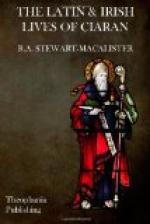37. Crichid [sic] of Cluain, a servant of Ciaran, went to Saigir and stayed there a long time. The devil tempted him to quench the sacred fire which the monks had in the kitchen. Said Ciaran of Saigir, that he would not eat food till there should come guests who would bring him fire. Crichid then went from them a short distance outside the city, and wolves slew him, but did not injure his body. When Ciaran the wright’s son heard of the death of his attendant, he went to Ciaran of Saigir to seek for him. When he arrived, Ciaran of Saigir said, “First of all ye need water for your feet; but we have no fire to heat water for you. Let you as guests give us fire, for God hath decreed this for you.” Then Ciaran the wright’s son raised his hands to heaven, and made fervent prayer. When the prayer was finished, there came fire from heaven, and rested on his breast. He protected his breast from the fire, and carried it with him to the monastery. He cast from him the fire on to the floor, and it did not hurt so much as the fur of the robe of white linen which he was wearing.
Then he revived his servant who had died before that, and he ate food with them. The two Ciarans then made a covenant together. “The wealth of the world,” said Ciaran son of the wright, “be in great Saigir.” “Knowledge and dignity incorruptible be in Cluain maccu Nois,” said Ciaran of Saigir.
XLIX. THE DEATH OF CIARAN
38. The soul of Ciaran was not more than seven months in this town before he went to heaven, on the ninth day of September. When Ciaran knew that the day of his death was drawing nigh, he made a prophecy with great sorrow. He said that great would be the persecution of his city from evil men towards the end of the world. “What then shall we do in the time of that crime?” said the monks; “is it by thy relics we shall stay, or shall we go elsewhere?” “Rise,” said Ciaran, “and leave my relics as the bones of a deer are left in the sun. For it is better for you to live with me in heaven than to stay here with my relics.”
When the time of his death was near to Saint Ciaran in the Little Church, in the thirty-third year of his age, on the fifth of the ides of September as regards the solar month, on Saturday as regards the day of the week, on the eighteenth day as regards the moon, he said, “Let me be carried out to the Little Height,” said he. And when he looked at heaven, and the height of air above his head, he said, “Awful is this road upward.” “Not for thee is it awful,” said the monks. “Truly, I know not,” said he, “any of the commandments of God which I have transgressed: yet even David son of Jesse, and Paul the apostle, dreaded this way.”
Then the stone pillow was taken from him, to ease him. “Nay,” said he, “put it under my shoulder. Qui enim perseuerauerit usque in finem, hic saluus erit.” Then angels filled the space between heaven and earth to receive his soul.




